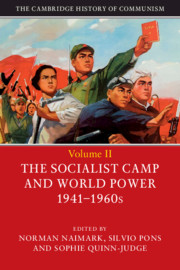16 results
17 - The History of the Vietnamese Communist Party 1941–1975
- from Part II - Becoming Global, Becoming National
-
-
- Book:
- The Cambridge History of Communism
- Published online:
- 28 September 2017
- Print publication:
- 21 September 2017, pp 414-440
-
- Chapter
- Export citation
Index
-
- Book:
- The Cambridge History of Communism
- Published online:
- 28 September 2017
- Print publication:
- 21 September 2017, pp 667-684
-
- Chapter
- Export citation
Contributors to Volume II
-
- Book:
- The Cambridge History of Communism
- Published online:
- 28 September 2017
- Print publication:
- 21 September 2017, pp xii-xvi
-
- Chapter
- Export citation
Copyright page
-
- Book:
- The Cambridge History of Communism
- Published online:
- 28 September 2017
- Print publication:
- 21 September 2017, pp iv-iv
-
- Chapter
- Export citation
Part II - Becoming Global, Becoming National
-
- Book:
- The Cambridge History of Communism
- Published online:
- 28 September 2017
- Print publication:
- 21 September 2017, pp 315-666
-
- Chapter
- Export citation

The Cambridge History of Communism
-
- Published online:
- 28 September 2017
- Print publication:
- 21 September 2017
Introduction to Volume II
-
-
- Book:
- The Cambridge History of Communism
- Published online:
- 28 September 2017
- Print publication:
- 21 September 2017, pp 1-12
-
- Chapter
- Export citation
Plate Section
-
- Book:
- The Cambridge History of Communism
- Published online:
- 28 September 2017
- Print publication:
- 21 September 2017, pp 667-684
-
- Chapter
- Export citation
Plates
-
- Book:
- The Cambridge History of Communism
- Published online:
- 28 September 2017
- Print publication:
- 21 September 2017, pp viii-x
-
- Chapter
- Export citation
2 - The Vietnam War as a World Event
- from Part I - Globalism and Crisis
-
-
- Book:
- The Cambridge History of Communism
- Published online:
- 28 September 2017
- Print publication:
- 21 September 2017, pp 50-71
-
- Chapter
- Export citation
Contents
-
- Book:
- The Cambridge History of Communism
- Published online:
- 28 September 2017
- Print publication:
- 21 September 2017, pp v-vii
-
- Chapter
- Export citation
Tables
-
- Book:
- The Cambridge History of Communism
- Published online:
- 28 September 2017
- Print publication:
- 21 September 2017, pp xi-xi
-
- Chapter
- Export citation
Part I - Expansion and Conflict
-
- Book:
- The Cambridge History of Communism
- Published online:
- 28 September 2017
- Print publication:
- 21 September 2017, pp 13-314
-
- Chapter
- Export citation
Vietnam: State, War and Revolution (1945–1946). By David G. Marr. Berkeley: University of California Press, 2013. xxvii, 721 pp. $55.00 (cloth).
-
- Journal:
- The Journal of Asian Studies / Volume 73 / Issue 2 / May 2014
- Published online by Cambridge University Press:
- 04 June 2014, pp. 569-571
- Print publication:
- May 2014
-
- Article
- Export citation
Vietnam. Le communisme vietnamien (1919–1991): Construction d'un État-nation entre Moscou et Pékin. By Céline Marangé. Paris: Presses de Sciences Po, 2012. Pp. 567. Appendices, Notes, Bibliography, Chronology, Index.
-
- Journal:
- Journal of Southeast Asian Studies / Volume 45 / Issue 1 / February 2014
- Published online by Cambridge University Press:
- 10 January 2014, pp. 147-149
- Print publication:
- February 2014
-
- Article
- Export citation
15 - Fraternal aid, self-defence, or self-interest? Vietnam's intervention in Cambodia, 1978–1989
-
-
- Book:
- Humanitarian Intervention
- Published online:
- 18 April 2011
- Print publication:
- 07 April 2011, pp 343-362
-
- Chapter
- Export citation



